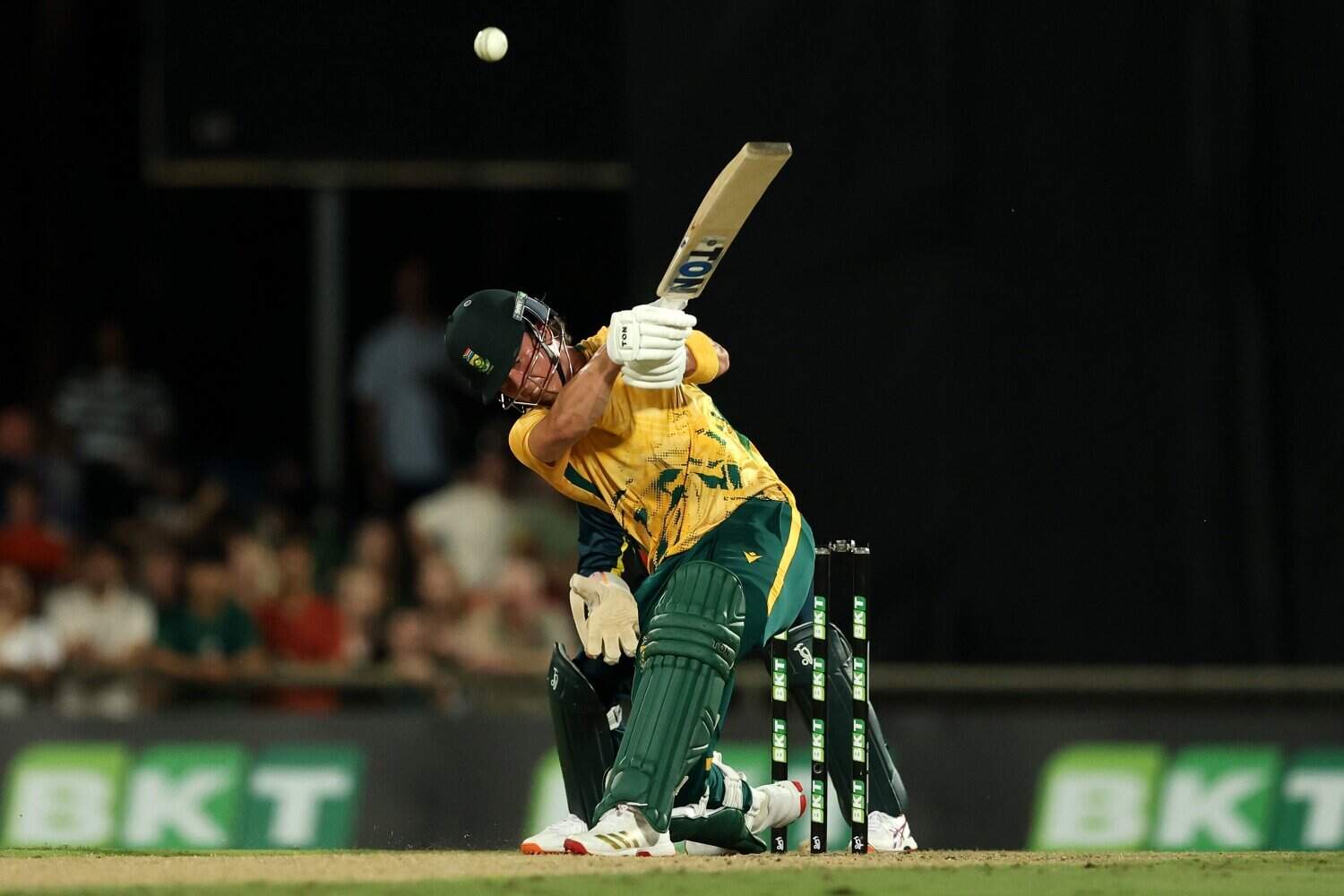On a cool night in Darwin the script for the T20 Series: Proteas vs Australia flipped, as Dewald Brevis unfurled a record 125 not out off 56 balls to power South Africa to 218 for 7, then watched the bowlers close out a 53‑run win that tied the series at 1–1 and set up a mouthwatering decider in Cairns.
This was not just big hitting, it was history, composure and control rolled into one. Brevis raised a 41-ball century, finished with 12 fours and eight sixes, and in the process claimed the highest individual T20I score by a South African, while becoming the youngest South African to reach a T20I hundred.
As he walked off to a standing ovation at Marrara Stadium, bat held high, you could almost picture the clustered ball marks that told the story of a sweet spot found and owned. It felt like a coming-of-age night in international colours, a performance that echoed across a ground still humming from the shock it delivered.
A knock shaped by patience and ambition
To those who know him from school days at Affies, the explosion was the product of years of quiet craft and fierce hunger. “That was a coming-of-age knock,” said Billy Brown, his former U14 and U15 coach, a retired teacher who remembers the teenager as relentless, driven and deeply ambitious, as much a perfectionist in failure as in success.
Brown’s memory stretches back to a conversation about building properly. He once slid a blank page across his desk and asked a young Brevis to draw a house. The lesson was simple, without a base the structure would not stand. “Get the foundation, and then you start building the house,” he advised. The word stuck, the player listened, and a year later the teenager peeled off 121 in a must-win schools match, then handed his coach a bat inscribed with gratitude. That early focus on foundation now feels like a precursor to Darwin.
The rebuild continued in December last year, when Brevis left the noise behind and spent part of his holiday inside the Paul Roos Indoor Centre with Deon Botes, the coach who helped shape his final years at Affies. They broke down his game, bat in hand, ball after ball, until blisters formed and the work cut deeper. “Instead of accepting or discounting all of it, we put it to the test,” Botes explained, describing sessions designed to hone strengths and probe weaknesses, all in a quiet space meant to find what truly works.
“The important thing was not to be right, but to find what works for him,” Botes said, after thousands of throws and bowling-machine drills that demanded stillness, balance and a straight bat to put bowlers under pressure.
Those tweaks surfaced in Darwin. Brevis looked calm at the crease, created room when needed, and trusted his hands. Later he distilled it in simple terms, that he was just watching the ball, being very still, and playing deliveries on merit. It read like a mission statement, a compact set of habits that he will carry into the next contest, a reminder that his brand is not just aggression, it is clarity.
How the innings unfolded
South Africa’s start had a jolt of adrenaline. Aiden Markram and Ryan Rickelton took 19 off Josh Hazlewood’s second over, each launching a six, and by the third the Proteas were 32 without loss. Then came the stumble, 50 for 2 at the end of the Powerplay, and a moment of confusion when 19-year-old Lhuan-dre Pretorius hit Glenn Maxwell into his pad and wandered as Alex Carey completed the easiest of stumpings.
Enter Brevis and Tristan Stubbs, and everything changed. Together they constructed a fourth-wicket stand worth 126 off 57 balls, a relentless 9.3-over surge that restored momentum and pushed Australia back on their heels. Stubbs’ 31 off 22 was the perfect foil, the quiet hum beneath Brevis’s thunder.
The turning point arrived against Maxwell, when Brevis already in rhythm launched successive sixes, then watched a chance on 56 slip through the hands of substitute fielder Matt Kuhnemann at long on. The over cost 24, the mood tilted, and South Africa never looked back. A single drop can reshape a chase, and this one felt like the precise instant Darwin became a night of no return for the hosts.
Records that matter and why they travel
Brevis’s 125 not out stands atop the South African T20I charts, nudging past Faf du Plessis’s mark of 119. It arrived faster than most thought possible, the hundred checked off in 41 deliveries, the strike rate soaring as he picked off full lengths and punished anything short. That pace, combined with rotation of strike, is why this was more than fireworks, it was a model of composure.
- Highest individual T20I score by a South African,
- youngest South African to score a T20I century,
- second-fastest T20I hundred for South Africa.
Behind the numbers was a batter in control of tempo. He accelerated when loose balls arrived, absorbed pressure when wickets fell around him, and kept the field spread with singles that forced Australia to choose between protection and attack. That blend of gears is how a player turns personal landmarks into a team’s match-winning total.
The bowling response that sealed it
With 218 on the board, the Proteas bowled like a unit. Australia’s chase lost shape early with key top-order wickets, and while Tim David again threatened with a forceful half-century, the reply never truly settled. Corbin Bosch returned a superb 3 for 20, while teenager Kwena Maphaka added 3 for 57 to follow his 4 for 20 from the first match, a reminder of a left-arm quick still learning, still striking, and still fearless on a big stage.
When the pressure rose, South Africa’s senior spearhead answered. Kagiso Rabada came back and removed the danger man David, a catch at midwicket that punctured Australia’s recovery. Legspinner Nqaba Peter, expensive in his first over, bounced back with the wicket of Alex Carey and finished with 1 for 35 from three, a small victory in resilience that matched the team’s wider resolve.
What Brevis said and why it matters
“I’ve always believed this is where I need to be and where I will be, so I never had doubts or anything,” Brevis said after claiming the Player of the Match award and the national record.
“This for me is just the start, I just want to keep working hard, do the same things, and the next match is the next match.”
At the break he described the method in even plainer language, crediting his faith, stressing that he was just watching the ball, being very still and not forcing anything, then adapting to conditions and playing on merit. It was the bare-bones manual that took him from a previous T20I best of 41 to an unbeaten 125.
The journey behind the moniker
Brevis’s path has often been framed through the prism of AB de Villiers, the Affies alumnus and national great who has mentored the younger batter. The “Baby AB” label follows him around, sometimes a compliment, sometimes a burden. In Darwin, the comparison felt less like a shadow and more like a signpost, a reminder that while influence matters, the player at the crease is carving a story of his own. He also offers more than a blade, a handy legspinner inspired by Shane Warne, he has already chipped in with wickets during this series, underscoring a genuine all-round threat.
There is ambition beyond the green and gold too. With the IPL in his sights and dreams of batting alongside Virat Kohli at Royal Challengers Bangalore, the hunger is there for bigger stages and bigger moments. Nights like Darwin speed up that journey, not because they arrive in a rush, but because they are rooted in years of work.
How the platform was built
South Africa’s innings was not flawless, yet the building blocks were set early. Markram and Rickelton’s assault on Hazlewood created immediate scoreboard pressure. Even after the wobble to 57 for 3 in the seventh over, composure returned through calculated risk, proper shot selection and a refusal to panic. That is the quiet strength behind the headline numbers, the method that allowed a young pair to add 126 in 57 balls and change the night’s rhythm.
Australia had their moments. Maxwell’s offspin asked questions, the Powerplay yielded chances, and Tim David once again looked like the man who could rip a chase from drift to drive. But the drop at long on, the Rabada breakthrough, and the sustained pressure from Bosch and Maphaka turned those flickers into ashes as the hosts were dismissed for 165 and the series was pulled level with authority.
Why this felt different
Brevis had played eight T20Is before Darwin, with a top score of 41, and there were whispers that international attacks had found a way to hold him. Tuesday made that narrative look premature. In just his ninth T20I he did not merely find his range, he expanded it, mixing the signature straight hits with deft scoops and sharp twos that pried gaps in the field.
The result was South Africa’s biggest T20I total against Australia, a number that travels because of how it was assembled. The innings had layers, early aggression, mid-overs consolidation, late acceleration, all knitted together by the same calm body language Botes had urged him to hold for a fraction longer. In cricket that fraction is often the difference between a nick and a gap, between a miss and the middle of the bat.
From Darwin to Cairns
The series now heads to Cairns for a decider that promises noise and nerve. Australia will adjust, so will South Africa, and the tactical dance will begin anew. If Brevis carries anything close to this touch, South Africa’s chances soar, but the message from the player is as simple as it is seasoned, the next match is a new match, and you have to be in the moment.
For the Proteas it is also about the bowlers who executed under pressure, Bosch with his lines, Maphaka with his wicket-taking intent, Rabada with his timing. Add in the growth of Peter and the utility of Stubbs, and you have a side that found both belief and blueprint in Darwin, a side that rediscovered its pulse after a tough series opener where Tim David’s 83 did the damage for the hosts.
The human pulse beneath the numbers
Sport’s best nights tend to be born long before the lights go on. They come from empty indoor nets during holidays, from the sting of blisters and the stubborn refusal to stop, from a school coach’s lesson about building a base, and an older mentor’s reminder that talent must be framed by method. When Brevis raised his bat, the applause was for the strike rate and the sixes, but also for the years it took to get here, and the quiet people who stood behind the journey.
That is why this did not feel like a flash in the pan. It felt like a statement. The scoreboard says South Africa 218 for 7, Australia 165 all out, series level. The heart says a young cricketer just told the world he belongs. The mind says the real test arrives next, a fresh strip, a fresh attack, and the same calm eyes over the ball. Whatever unfolds in Cairns, the Proteas travel with momentum, and with the comforting knowledge that the kid dubbed Baby AB can win a night on his own, then quickly put the bat back in its cover and look forward to the next job.
Key match facts at a glance
- South Africa 218 for 7, highest T20I total against Australia,
- Australia 165 all out, Proteas won by 53 runs,
- Dewald Brevis 125 not out off 56 balls, 12 fours and 8 sixes.
Sometimes sport gifts you statistics that sing, and sometimes it gives you stories that linger. In Darwin, South Africa found both, and as the series tilts toward its finale, the image that remains is simple, a young man standing tall, bat raised, a nation rising with him, and a contest perfectly poised for a finale.






